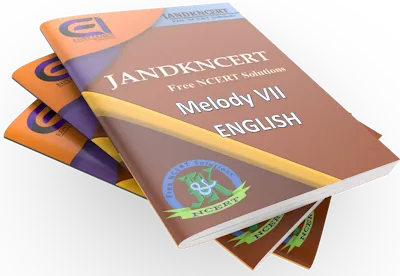JANDKNCERT - Free NCERT Solutions
English | Melody VII
JANDKNCERT – provides free solutions for
most of the ncert books. In the library of JANDKNCERT, you will find almost all
kinds of study material. In this post you will find the summary, questions and
answers of the poem ‘Chivvy’, taken from the recently introduced English
for JK UT students, that is, Melody VII. It is actually a Honeycomb version of
ncert that has already been introduced in other states of the Country. Some of
the chapters are already been added to the Tulip Series of Class 7th and you
can check these chapters by clicking this link https://www.jandkncert.com/p/free-ncert-solutions-for-class-7th_43.html. Here we will try to
provide you the easy solutions for the chapters given in this Melody VII or
Honeycomb. Read the poem from the Textbook of English Melody VII of JK or download
the same as the Honeycomb series from the ncert website.
JANDKNCERT - Free NCERT Solutions
English | Melody VII
Poem 4. Chivvy (Michael Rosen)
Grown-ups
say things like:
Speak
up
Don’t
talk with your mouth full
Don’t
stare
Don’t
point
Don’t
pick your nose
Sit
up
Say
please
Less
noise
Shut
the door behind you
Don’t
drag your feet
Haven’t
you got a hankie?
Take
your hands out of
your
pockets
Pull
your socks up
Stand
up straight
Say
thank you
Don’t
interrupt
No
one thinks you’re funny
Take
your elbows off the table
Can’t
you make your own
mind
up about anything?
MICHAEL ROSEN
Short Summary
The poem ‘Chivvy’ is written by Michael
Rosen. He has expressed his situation when he was five years old. His mother always
asked him to follow her instructions and prohibited him from doing anything
wrong. Michael writes all his experiences in the form of a poem and relates the same
to the children who face the same situation at this stage. Although his mother
wanted him to be moderate in public he took it in another way. He says
that, at times, grown-ups always instruct children to follow them and prohibit
them from living in their own way. They say, don’t talk while eating, say please,
thank you, sit, stand straight etc. At times they prohibit the children and at
times, they ask them to make independent decisions.
Download
| English | Melody VII | Textbook | PDF
Working with the Poem
Question
1.
Discuss
these questions in small groups before you answer them.
(i)
When is a grown-up likely to say this?
Don’t
talk with your mouth full.
Answer:
A
grown-up is likely to say not to talk when he is eating and his mouth is full
of something that he eats.
(ii)
When are you likely to be told this?
Say,
thank you.
Answer:
We
are likely told to say thank you when someone helps us and offers something.
(iii)
When do you think an adult would say this?
No
one thinks you are funny.
Answer:
We
think an adult would say that we are not funny when we are given an activity to
perform and we feel shy or when we do some funny tricks or talk funny.
Question
2.
The
last two lines of the poem are not prohibitions or instructions. What is the
adult now asking the child to do? Do you think the poet is suggesting that this
is unreasonable? Why?
Answer:
Yes,
the last two lines are neither prohibitions nor instructions. The adult is now
asking children to make independent decisions. Yes, this may be unreasonable in
the poet’s suggestion because all the time the adults instruct children to follow
them and suddenly, they ask them to take their decisions.
Question
3.
Why
do you think grown-ups say, the kind of things mentioned in the poem? Is it
important, that they teach children good manners, and how to behave in public?
Answer:
The
kind of things mentioned in the poem are important for children because these
things guide them to differentiate between right and wrong. It is important
to teach children good manners and how to behave in public because they will only
be respected when they are well-mannered.
Question
4.
If
you had to make some rules for grown-ups to follow, what would you say? Make at
least five such rules. Arrange the lines as in a poem.
Answer:
Don’t
shout at children.
Don’t
beat them.
Don’t
use your mobile while eating.
Don’t
use abusive language for anyone.
Spend
more time with pets and children.
Don’t
stop children from playing.






.webp)




Leave your comment here.